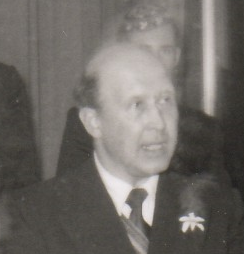DI Ernst Marboe

Personalia
Born:
Died:
Profession:
Persecution:
Dismissal 1938
Memberships
Curriculum Vitae
Ernst Marboe was born the son of a royal state railway official, grew up in the Fasan district of Vienna's third district and attended secondary school in Radetzkystraße (3rd district), where he graduated in 1926. He then began studying electrical engineering at the Vienna University of Technology (Dipl. Ing. 1936). In 1929 he joined the student fraternity Bajuvaria. During his studies, he became involved in the Catholic-German Students' Union (KDHÖ) at the Technical University, was its chairman for a time and, after 1933, was a trustee of the Austrian Students' Union for a while.
After graduating, Ernst Marboe joined the Lower Austrian provincial government in 1936. He was dismissed without notice after the Anschluss in March 1938. A short time later, he is critically injured in a traffic accident involving a German Wehrmacht truck, the driver of which is found guilty in a court case. As a result, Ernst Marboe is hospitalized for months and is subsequently unfit for military service, which spares him from military service.
After recovering, Ernst Marboe finds a job in a company involved in the production and distribution of vehicle fuels (petrol, coke, gas). Towards the end of the war, the family moves to Salzburg and lives in Strobl am Wolfgangsee. The reason for this was that they took in two Frenchmen who had escaped from a labor camp and were therefore afraid of persecution by the Nazi authorities, who were sometimes particularly rigid during the collapse of the Third Reich. After the end of the war, Ernst Marboe immediately found work in the local transport system of the city of Salzburg, which had to be rebuilt.
In 1945, Ernst Marboe moved to the Federal Press Service of the Federal Chancellery. In 1948, he publishes "The Austria Book" on behalf of the Federal Press Service, which he had already begun writing in Strobl. This book subsequently went through several editions and was also translated into the four most important languages. The number of copies sold of the German-language edition reaches six figures. "The Austria Book" is distributed free of charge to schools, among others, and is intended to push back the idea of annexation in Austria after the turmoil of National Socialism and the war and convey a positive image of Austria. It continues the idea of Austria, which was strongly promoted politically in the 1930s, also as a diametric opposition to the National Socialist idea of a Greater Germany.
Places
Residence:
Citations
Biolex des ÖCV unter www.oecv.at/biolex; Stand: 02.10.2022.
